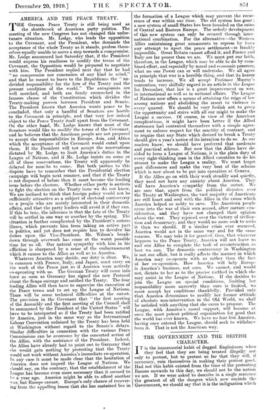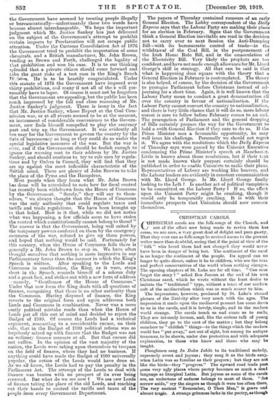THE GOVERNMENT AND THE BRITISH CHARACTER.
T T is the immemorial habit of dogged Englishmen when 1 they feel that they are being treated illegally not only to protest, but to protest so far that they will, if necessary, ruin themselves in making their protest good. Had not this habit existed from the time of the protesting Barons onwards to this day, we should not be the nation we are. If we were asked to describe in a single sentence the greatest of all the dangers which now encircle the Government, we should say that it is the indignation which the Government have aroused by treating people illegally or bureaucratically—unfortunately these two words have become almost interchangeable. We hope the important judgment which Mr. Justice Sankey has just delivered on the subject of the Government's attempt to prohibit certain imports by Proclamation will not escape public attention. Under the Customs Consolidation Act of 1876 the Government tried to prohibit the importation of some chemicals, and a British manufacturer, Mr. John Brown, trading as Brown and Forth, challenged the legality of that prohibition and won his case. It is to our thinking splendid that a private citizen should come forward and take the great risks of a test case in the King's Bench Di :ision. He is to be heartily congratulated. Under this statute of 1876 the Government have imposed over thirty prohibitions, and many if not all of the -e will pre- sumably have to lapse. Of course it must not be forgotten that the Government are appealing, but the public has been much impressed by the full and close reasoning of Mr. Justice Sankey's judgment. There is irony in the fact that Mr. Justice Sankey, whose Report at the Coal Com- mission was, or at all events seemed to be at the moment, an instrument of considerable convenience to the Govern- ment, now finds himself compelled to play the contrary part and trip up the Government. It was evidently all too easy for the Government to govern the country by the fiats of bureaucracy so long as they could do so under the special legislative measures of the war. But the war is over, and if the Government should be foolish enough to ignore the warning sent to their address by Mr. Justice Sankey, and should continue to try to rule men by regula- tions and by Orders in Council, they will find that they are up against the most inflexible characteristic of the British mind. There are plenty of John Browns to take the place of the Pyms and the Hampdens. Most people when they learn what Mr. John Brown has done will be astonished to note how far fiscal control has recently been withdrawn from the House of Commons by the Government. " Surely," they will say to them- selves, " wo always thought that the House of Commons was the •only authority that could regulate taxes and tariffs and trade regulations. We have been brought up in that belief. How is it that, while we did not notice what was happening, a few officials seem to have stolen the control which constitutionally cannot belong to them? " The answer is that the Government, being well suited by the temporary powers conferred on them by the emergency measures of the war, refused to give up those powers, and hoped that nothing would be said. Fortunately for this country, when the House of Commons fails there is generally a Mr. John Brown to step in. We have often thought ourselves that nothing is more impressive in our Parliamentary forms than the manner in which the King's Speech is written. After speaking to the Lords and Commons in combination, the King, as it were, stops short in the, Speech, reminds himself of a solemn duty and a great fact, and strikes out with a new form of address —namely, " Gentlemen of the House of Commons."
Under that new form the King deals with all questions of finance, recognizing that there is no other authority than the Commons. Having disposed of finance, the King reverts to the original form and again addresses both Lords and Commons in combination. Never was a more costly political mistake made than when the House of Lords put all this out of mind and decided to reject the Budget of 1909. Of course the Lords had a technical argument, amounting to a considerable excuse, on their side, that in the Budget of 1909 political reform was so hopelessly mixed up with finance that the Budget was not an ordinary finance measure at all. But that excuse did not suffice. In the opinion of the vast majority of the nation, the Lords were taking upon themselves to trespass on the field of finance, where they had no business. If anything could have made the Budget of 1909 universally popular, the action of the Lords would have done so.
As we all know, the Lords had to pay the penalty in the Parliament Act. The attempt of the Lords to deal with finance was beaten with no prospect of its ever being renewed. But what do we see now ? We see new Lords of finance taking the place of the old Lords, and reaching out their hands to control the tariffs and taxes of the people from every Government Department. The papers of Thursday contained rumours of an early General Election. The Lobby correspondent of the Daily Express says that the Labour Party are making their plans for an election in February. Signs that the Government think a General Election inevitable are read in the decision not to carry over to next Session the Anti-Dumping Bill—with its bureaucratic control of trade—in the withdrawal of the Coal Bill, in the postponement of the Irish Home Rule Bill, and in the emasculation of the Electricity Bill. Very likely the prophets are too confident, and have not made enough allowance for Mr. Lloyd George's skill in strategy. All that can be said is that what is happening does square with the theory that a General Election in February is contemplated. The theory is also helped, of course, by the decision of the Government to prorogue Parliament before Christmas instead of ad- journing for a short time. Again, it is well known that the Labour Party mean to conduct a great demonstration all over the country in favour of nationalization. If the Labour Party cannot convert the country to nationalization, and there is very little chance that it will do so, more labour unrest is sure to follow before February comes to an end. The prorogation of Parliament and the general dropping of Bills certainly prepare the way for the Government to hold a swift General Election if they care to do so. If the Prime Minister sees a favourable opportunity, ho may well issue his challenge. Personally we should not regret it. We agree with the resolutions which the Daily Express of Thursday says were passed by the Unionist Executive condemning the Prime Minister's speech at Manchester. Little is known about those resolutions, but if their text is not made known their purport certainly should be published in order to enable Unionists to make their plans. Representatives of Labour are Worldng like beavers, and the Labour leaders are evidently in constant communication with Mr. Lloyd George. Is Mr. Lloyd George finally looking to the Left ? Is another act of political vampirism to be committed on the Labour Party If so, the effect upon the Unionist Party might be crushing, though it would only be temporarily crushing. It is with their immediate prospects that Unionists should now concern themselves.







































 Previous page
Previous page